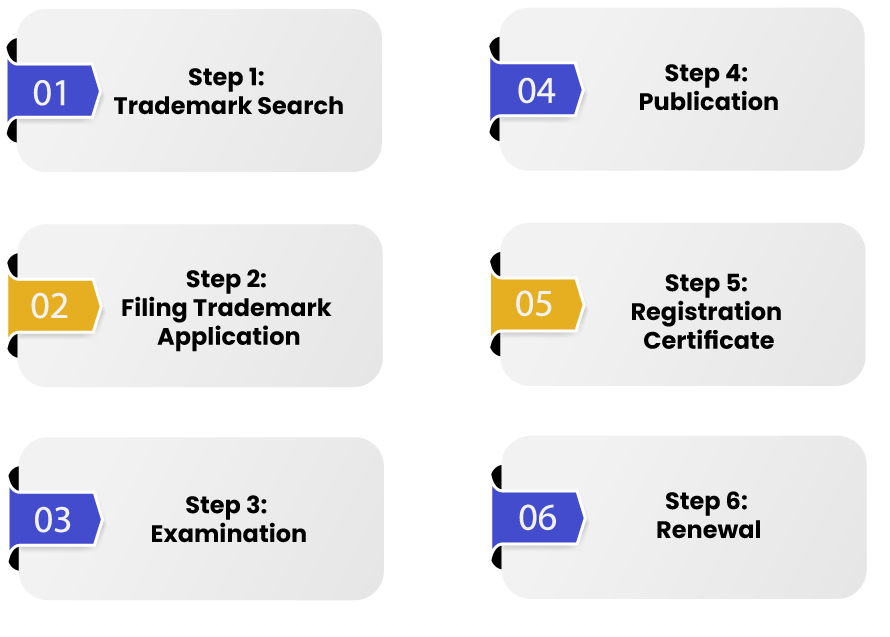A Complete Guide on Procedure for Brand Registration in India

Karan Singh | Updated: Mar 18, 2021 | Category: Trademark
A brand can be a logo, word, symbol, tagline or a combination of these. Anything which is used by service providers or manufacturers to know their goods or services and differentiate the products and services of the owner from those of its competitors. A brand is registered by the Controller General of Patents Design and Trademarks, Government of India, Ministry of Commerce and Industry. The procedure for Brand Registration in India is governed under the Trademark Act, 1999 and permit the owner of a brand to sue for damages when trademark infringements occur. If your brand is similar to an already registered brand for which an application has already been made cannot be registered.
Trademark Search tool is very beneficial to avoid such confusion during Brand Registration. An applicant must do in-depth research on Trademark Search to make sure that the brand name which he or she is going to register in future is already registered or not. For example, Coca-Cola and Pepsi belong to the same industry and can be noticeably identified by many beverages and the sign of quality. Similarly, KitKat and Snickers is a trademark in a similar industry. In this blog, we discuss the procedure for Brand Registration in India.
Table of Contents
Types of Trademarks in India
- Descriptive Mark: This mark states one or more characteristics of a service or products and only serve to define the product.
- Generic Mark: This mark is for describing the qualities of a product, ingredients, or characteristics of the products.
- Suggestive Mark: This mark tells about the goods or services, and a mark in this group qualifies for protecting without requiring secondary meaning.
- Fanciful Mark: It is a name or logo which is different from anything that exists. This is the easiest way for obtaining trademark protection because it doesn’t compete with anything and become too generic.
What are the Benefits of Brand Registration in India?
Following are some benefits of Brand Registration in India:
- Exclusive Rights: The Trademark Act gives an exclusive right to the brand owner to use the brand in respect of the products and services covered by it. An owner of a registered brand can sue anyone trying to copy or misuse their mark or brand name/logo.
- Intangible Property: One of the benefits of filing a trademark is to create a recognizable intangible property in the legal sense. Registration of a brand or trademark is a value store of reputation or goodwill that a product or service has. An unregistered brand name or trademark will never give an independent presence, it will always form the goodwill part, and it will be committed to the business. A Brand Registration can be transferred like any other asset which is owned by a company or an individual.
- Deterrent: It discouragesother traders or dealers from using trademarks that are identical or similar to your registered trademark. You put others on notice of your rights by using the ® symbol. On the other hand, a registered mark can be found when others search the official register before choosing to start using a particular name.
- Right to Use: Once your trademark or brand is registered, you can use the ® symbol at the end of your brand name for the goods and services listed in the Trademark registration.
- Licensing: You can license the registered trademark; it is recorded on the Trademark Register that the rights are given to the proprietor (Licensee) to institute legal arranged in the infringement event.
- Transfer: You can transfer your registered trademark to others, and it is not possible for a common trademark law that can only be transferred with the business.
Documents Required for Brand Registration in India
Following is the list of all the vital documents required at the time of procedure for Brand Registration in India:
- Submit a copy of a trademark, or name or logo.
- Submit the detailed list of all goods or services to be registered.
- Submit Power of Attorney signed by the applicant.
- In case the applicant is using a trademark before applying, mention a specific date on which that trademark is used.
- Submit all the details of the applicant, such as name, address, and nationality.
What is the Detailed Procedure for Brand Registration in India?
You can follow step by step procedure for Brand Registration in India as mentioned below:

- Step 1: Trademark Search: The most important step in the procedure for Brand Registration is to a proper Trademark Search. Searching for a Trademark is free of cost to check if your brand or company name, or logo is similar or identical to other registered trademarks or not. Generally, the Trademark Attorney conducts this search with the Trademark Office to check whether there are any identical trademarks that are already registered under a particular class or not. There are two different modes of Trademark Search are available; offline and online. If you do both, then it is the best way to search for a trademark. It takes hardly one or two working days to search for a trademark. Once you are satisfied with your brand or trademark and you are 100% sure that your brand is unique and distinct, then you can go to the next step.
- Step 2: Filing Trademark Application: Once you search for a unique brand or trademark. Then you can file an application for Brand Registration, and it takes only one or two working days to file or draft an application by the Trademark Attorney provided that your name or logo found to be distinctive. Moreover, if your brand name is similar to an already registered trademark, then you need to modify your brand name. These days, filing an application is mostly done online. Once you file the application, a receipt is issued to you for future reference.
- Step 3: Examination: After filing an application for brand registration, the examiner will conduct an examination for any inconsistencies. The examination might take around 12 to 18 months. The examiner may accept the trademark completely, conditionally or object. If the examiner accepts the trademark completely, the trademark or brand name will be published in the Trademark Journal. If the examiner accepts the trademark conditionally, then the conditions must be fulfilled, or the objections should be mentioned in the examination report, and a month will be provided to fulfil all the conditions or reply to the objections. Once the response is accepted, the mark gets published in the journal. If the response is not accepted, the applicant can request a hearing. In a hearing, if the examiner feels that the brand should be allowed for registration, then it proceeds for publication.
- Step 4: Publication: The publication step is incorporated in the procedure for Brand Registration so that anyone who objects to the Brand Registration has the opportunity to oppose the same. If there is no opposition after 3 to 4 months from publication, the trademark proceeds for registration of a brand. In case of any opposition, there is a reasonable hearing and decision are given by the Registrar.
- Step 5: Registration Certificate: Once the application continues for Brand Registration, following publication in Trademark Journal, a registration certificate will be issued.
- Step 6: Renewal: The trademark or brand can be renewed continuously after every ten years.
Conclusion
As seen from the above, the procedure for Brand Registration in India does not require much effort. It’s a straightforward process but one that is nonetheless very essential for Brand Registration. Although the procedure for Brand Registration is lengthy and requires some extra money in the pocket, it is worth investing in legally safeguarding your brand.
Also, Read: Importance of Trademarks for your Business – A Complete Guide














